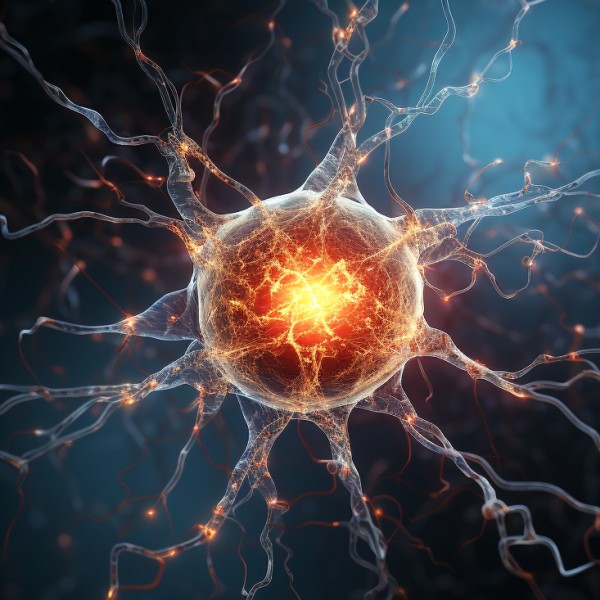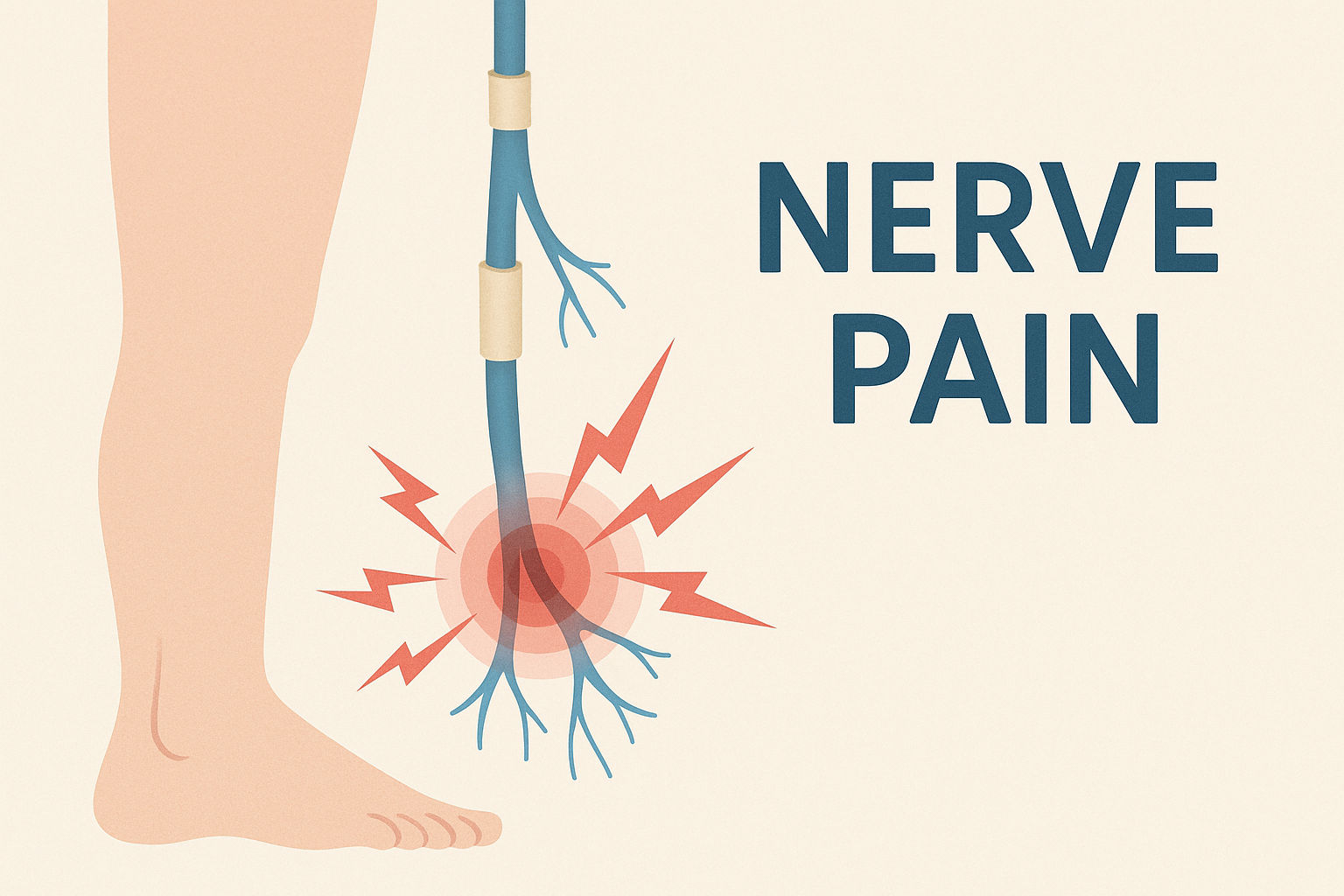If you’ve ever felt burning, tingling, numbness, or stabbing sensations in your hands or feet, you may have wondered: Is this neuropathy or just nerve pain? Are they the same thing?
It’s a common question—and an important one. While people often use the terms interchangeably, neuropathy and nerve pain are not identical. Understanding the difference can help you find the right treatment, avoid complications, and communicate more effectively with your doctor.
What Is Neuropathy?
Neuropathy is a broad medical term meaning nerve damage or disease. Specifically, it refers to peripheral neuropathy, which affects the peripheral nerves outside the brain and spinal cord.
These nerves control everything from muscle movement to sensory information (like touch and pain) to automatic functions (like digestion and blood pressure).
When the nerves are damaged, they can:
- Misfire pain signals
- Stop transmitting sensation altogether
- Cause weakness or loss of coordination
Common symptoms of neuropathy include:
✅ Tingling or pins-and-needles sensation
✅ Numbness or reduced ability to feel temperature
✅ Burning, stabbing, or electric-like pain
✅ Muscle weakness or cramping
✅ Loss of balance or coordination
The most common causes of neuropathy are diabetes, chemotherapy, alcohol overuse, vitamin B12 deficiency, autoimmune diseases, and certain medications.
What Is Nerve Pain?
Nerve pain (also called neuropathic pain) is a type of pain that happens when the nerves are irritated, damaged, or malfunctioning.
In other words, nerve pain is a symptom—not a diagnosis. It can be caused by neuropathy, but it can also come from other conditions such as:
- Herniated discs pressing on spinal nerves
- Carpal tunnel syndrome compressing wrist nerves
- Shingles damaging skin nerves
- Sciatica from pinched sciatic nerves in the lower back
Nerve pain feels very different from ordinary pain like a bruise or muscle ache. People often describe it as:
🔥 Burning
⚡ Electric shock or shooting
🪡 Pins and needles
💥 Stabbing or sharp
🥶 Cold or icy sensation
It’s often worse at night, and sometimes even light touch or clothing can feel unbearable (a condition called allodynia).
Key Differences
| Neuropathy | Nerve Pain |
|---|---|
| A condition (nerve damage) | A symptom (type of pain) |
| Can cause pain, numbness, weakness | Only refers to pain or painful sensations |
| Causes may include diabetes, B12 deficiency, chemo, alcohol | Causes may include neuropathy, nerve compression, trauma |
| May progress without treatment | Pain may come and go or flare with activity |
Why It Matters
Confusing neuropathy with nerve pain can lead to misunderstanding the underlying problem. For example:
- If you only treat pain with painkillers but ignore the underlying neuropathy, you risk progressive nerve damage, ulcers, infections, and even amputations (especially with diabetic neuropathy).
- If you focus only on numbness and ignore the pain component, you might miss opportunities for medications that relieve nerve pain specifically, such as pregabalin, gabapentin, or duloxetine.
Simply put: Pain is only part of the neuropathy picture. Managing both pain and the underlying nerve damage is key.
How to Get the Right Diagnosis
If you have symptoms, see a healthcare provider—don’t self-diagnose. Here’s what usually happens during evaluation:
- Detailed history
Your doctor will ask when symptoms started, how they feel, what makes them better or worse, and any medical conditions you have. - Physical exam
This may include checking your reflexes, muscle strength, balance, temperature sensation, and touch response. - Blood tests
Tests can check for diabetes, vitamin deficiencies, thyroid problems, and autoimmune conditions. - Nerve studies (EMG, nerve conduction tests)
These can help determine if nerves are damaged and how severely. - Imaging
MRI or ultrasound may be used if nerve compression (like carpal tunnel or sciatica) is suspected.
Treatment Differences
If it’s neuropathy:
- Address the underlying cause (control diabetes, stop alcohol, supplement B12, adjust medications)
- Protect feet from injury (especially in diabetes)
- Consider physical therapy for strength and balance
- Use medications to relieve nerve pain if present
If it’s nerve pain from other causes:
- Treat the source of compression (splints for carpal tunnel, surgery for herniated disc if severe)
- Use nerve-specific pain medications (gabapentin, pregabalin, duloxetine, amitriptyline)
- Consider non-drug therapies (TENS unit, acupuncture, cognitive behavioral therapy)
Final Takeaway
Neuropathy is the condition. Nerve pain is one possible symptom of it—but not the only one.
If you’re experiencing burning, tingling, numbness, or weakness, don’t brush it off as “just pain.” Get evaluated to uncover the underlying cause and get the right treatment plan.
With proper management, you can reduce pain, prevent further nerve damage, and improve your quality of life.
Quick FAQ
1. Can you have neuropathy without pain?
Yes! Many people have numbness or weakness without noticeable pain.
2. Can you have nerve pain without neuropathy?
Yes—nerve pain can result from compression, trauma, or inflammation without widespread nerve damage.
3. Does B12 help with nerve symptoms?
If B12 deficiency is the cause of neuropathy, supplementation can help—but always check with a doctor first.
Disclaimer: This article is informational and not a substitute for professional medical advice.


One response to “Neuropathy or Nerve Pain? Here’s How to Tell the Difference”
[…] or joint pain caused by strains, sprains, arthritis, bruising, backaches, as well as treating nerve pain (neuralgia) in people who have had herpes zoster, or […]